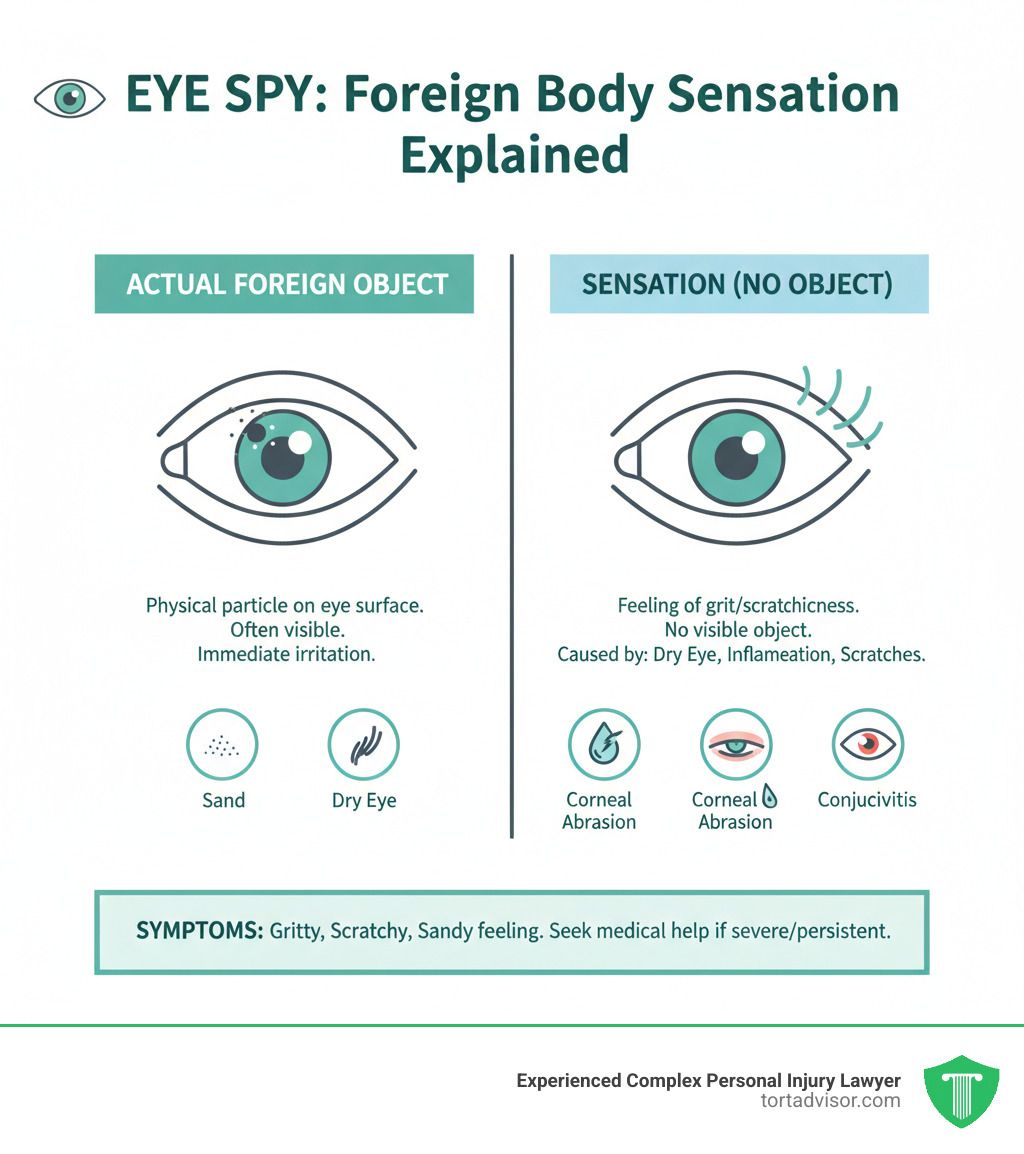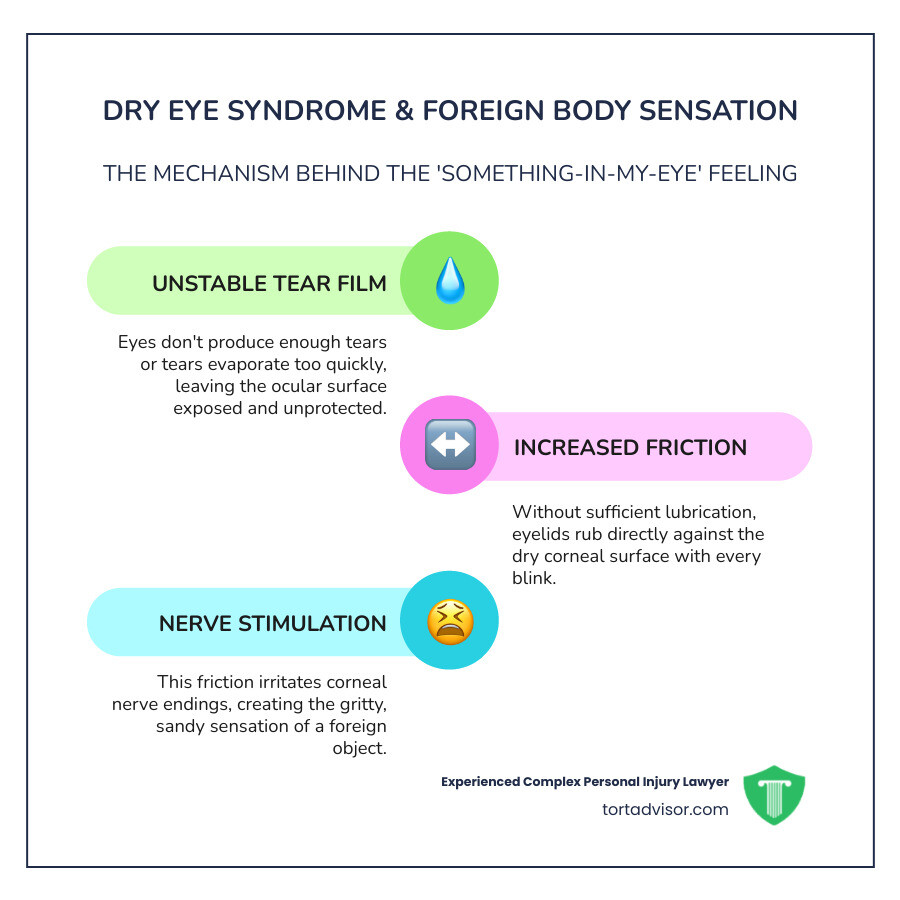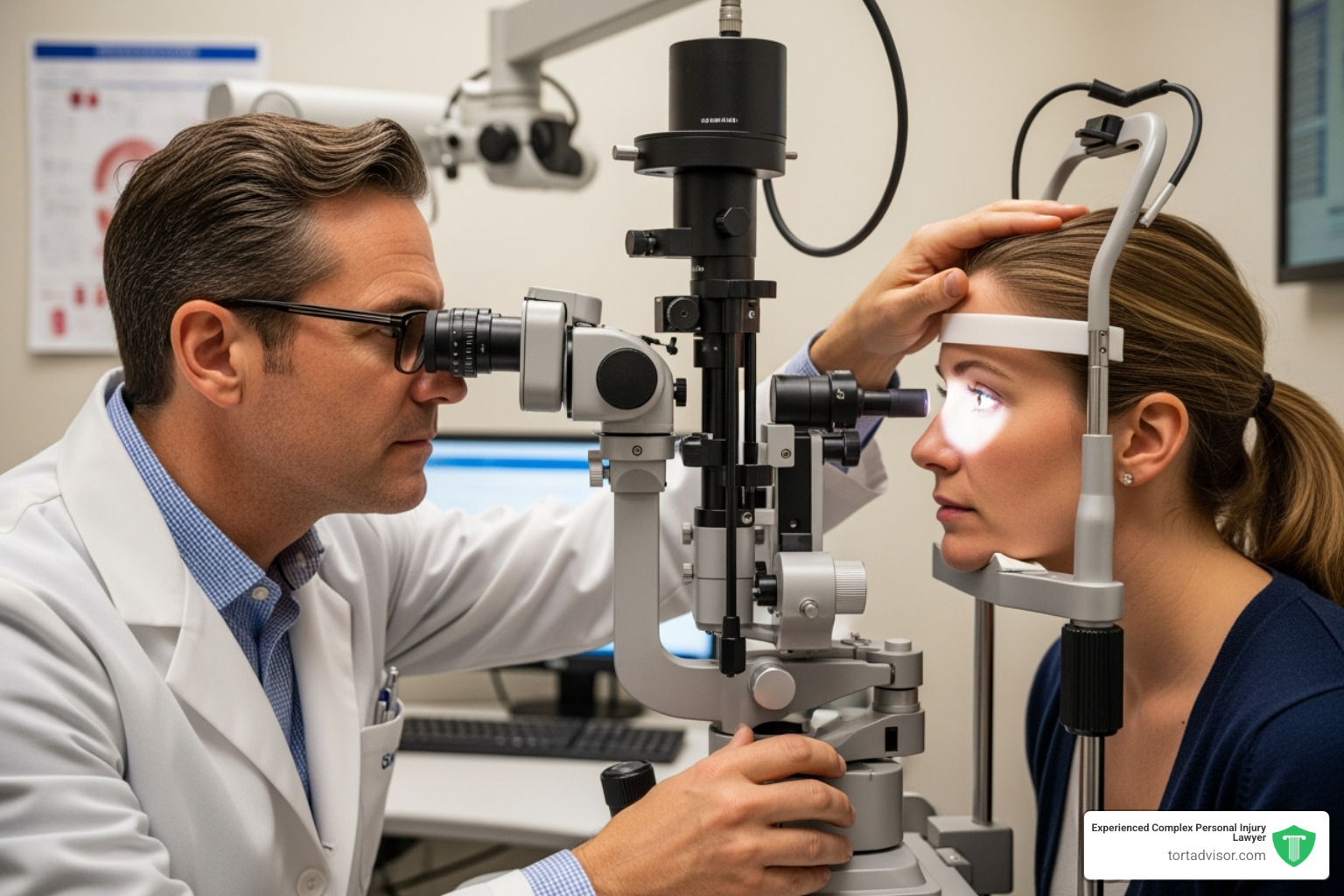


Understanding That Gritty, Scratchy Feeling in Your Eye
Foreign body sensation is the feeling that something is stuck in your eye—like sand or an eyelash—even when nothing is there. This common symptom can be a minor irritation or a sign of a more serious condition.
Quick Answer: What Causes Foreign Body Sensation?
- Dry Eye Syndrome – Insufficient tear film causes friction.
- Actual Foreign Objects – Dust, dirt, an eyelash, or contact lens debris.
- Blepharitis – Inflammation of the eyelids.
- Corneal Abrasion – A scratch on the eye’s surface.
- Conjunctivitis – Inflammation or infection of the eye’s outer layer.
- Post-Surgical Complications – Especially after cataract or LASIK surgery.
The sensation comes from the cornea, which is packed with nerve fibers. When these nerves are irritated by an object, inflammation, or dryness, your brain interprets it as something foreign in your eye.
Most cases resolve with home care within 24 to 48 hours. However, persistent symptoms, severe pain, vision changes, or light sensitivity require immediate medical attention.
I’m Mason Arnao. While this article focuses on eye health, my work involves connecting people with legal resources. I’ve seen cases where this sensation resulted from workplace injuries or defective products, requiring both medical and legal help. Understanding your condition is the first step, whether for relief or to determine if negligence was involved.
What is Foreign Body Sensation and What Does It Feel Like?
Foreign body sensation is the certain feeling that a speck of dust or an eyelash is in your eye, even if you can’t find it. People describe this constant irritation as a gritty, sandy, or scratchy feeling, as if something is rubbing the eye with every blink.
The sensation is intense because the cornea (the clear front surface of the eye) and conjunctiva (the membrane covering the white of the eye) are packed with nerve fibers. With more nerve endings than almost anywhere else on the body, even the tiniest irritation feels significant. When these tissues are irritated, the nerves send signals to your brain, which interprets them as a foreign object.
Associated Symptoms
Foreign body sensation rarely occurs alone. It’s often accompanied by a protective response from your eye, leading to:
- Eye pain, from a dull ache to sharp discomfort
- Redness or a bloodshot appearance
- Excessive tearing as the eye tries to flush out the irritant
- Frequent or forceful blinking
- Light sensitivity (photophobia)
- Temporary blurred vision
- Itching
Sensation Without an Object
Often, you can have intense foreign body sensation with nothing in your eye. Your tears are efficient at washing away particles, so a persistent feeling often points to an underlying issue. This “phantom” sensation can be caused by:
- Corneal abrasion: A microscopic scratch on your cornea can feel like a foreign object long after the initial injury.
- Dry eyes: An inadequate tear film causes friction between your eyelid and cornea with each blink, creating a sandy feeling.
- Inflammation: Conditions like blepharitis or conjunctivitis irritate corneal nerves.
- Nerve irritation: Damaged or hypersensitive nerve endings can send false signals.
Recognizing that the sensation can occur without an object is key to seeking the right treatment beyond just flushing your eye. For more on eye health, the National Eye Institute is a valuable resource.
Common Causes of That Annoying Foreign Body Sensation
That scratchy, irritating sensation can come from a wide range of sources—from something genuinely stuck in your eye to conditions that simply make it feel that way.
Environmental and Physical Irritants
Often, the cause is simple: something is actually in your eye.
- Dust, sand, and dirt: Wind can easily blow tiny particles into your eye, where they feel enormous against the sensitive cornea.
- Eyelashes: A stray eyelash on the eye’s surface can be very irritating.
- Makeup debris: Flakes of mascara or eyeliner can break off and cause discomfort, especially if trapped under a contact lens.
- Contact lens problems: A poorly fitting, dirty, or torn contact lens can cause significant irritation. A lens can also slip under the eyelid, causing an intense foreign body sensation. (A contact lens cannot get lost behind your eye.)
Underlying Medical Conditions Causing Foreign Body Sensation
Many people experience this sensation even when their eye is clear of debris, usually due to an underlying condition.
Dry Eye Syndrome is a leading cause. When your eyes lack enough quality tears, the protective tear film breaks down. This causes friction between your eyelid and cornea with every blink, resulting in a gritty feeling. Chronic dry eye can damage the eye’s surface, creating a cycle of irritation.
Blepharitis is eyelid inflammation from clogged oil glands or bacteria, causing crusty eyelids, itching, and a gritty sensation. A stye (an infected gland) or chalazion (a blocked gland) can also create a painful bump that presses on the eye, mimicking a foreign body.
A corneal abrasion (a scratch on the cornea) is a common and painful injury that feels like a rock is in your eye. Most heal within 48 hours. More seriously, a corneal ulcer is an open, infected sore on the cornea. It causes severe pain and discharge and requires immediate medical care to prevent vision loss.
Conjunctivitis (“pink eye”) is inflammation of the conjunctiva from a virus, bacteria, or allergen. It causes redness, discharge, and a gritty feeling.
Other causes include anatomical issues like floppy eyelid syndrome, recurrent corneal erosions (where old injuries reopen), and even eye strain from reduced blinking during screen use. Certain systemic drugs and post-operative complications from procedures like cataract surgery can also cause a persistent foreign body sensation.
When Could a Foreign Body Sensation Indicate Negligence?
While often a temporary annoyance, a foreign body sensation can sometimes result from someone else’s carelessness. A dangerous workplace, a faulty product, or a botched medical procedure can turn a medical issue into a legal one.
Workplace and Environmental Injuries
Workplaces like construction sites, manufacturing floors, and woodworking shops are high-risk for eye injuries from flying debris. Protective eyewear can prevent up to 90% of these injuries, yet they remain common. When employers fail to provide or enforce the use of safety goggles or create unsafe conditions, they may be negligent. An injury from metal shards, sawdust, or a chemical exposure can cause immediate foreign body sensation and lead to chronic problems like corneal abrasions or burns. If your injury resulted from a failure to follow safety protocols, it may be considered negligence.
Complications from Medical Procedures or Defective Products
Persistent foreign body sensation can also arise from medical procedures or products. While procedures like Cataract surgery and LASIK are generally safe, a small percentage of patients experience severe, lasting discomfort. If this results from a botched procedure, surgical error, or avoidable corneal nerve damage, it may be medical negligence.
Similarly, defective contact lenses that are torn or contaminated can cause scratches and infections, representing a product defect. If your injury stems from a faulty medical product, you may have legal options.
When your foreign body sensation is caused by an employer’s, surgeon’s, or manufacturer’s negligence, you deserve accountability. We connect people in these situations with experienced attorneys for eye injury cases.
Diagnosis, Treatment, and Prevention
Knowing how to handle the sensation and when to seek help is crucial for protecting your vision.
At-Home Care and When to See a Doctor
First, do not rub your eye, as this can cause a scratch or push an object deeper. Instead, try these home care steps:
- Flush your eye with clean water or sterile saline solution to wash away irritants.
- Use over-the-counter artificial tears to soothe dryness and flush debris. Preservative-free drops are best for frequent use.
- Apply a warm, moist compress to your closed eyelid for relief from blepharitis or a stye.
See a doctor immediately if you experience:
- Severe or worsening eye pain
- Vision changes or loss
- Increased light sensitivity
- Signs of infection (pus, swelling, fever)
- A suspected puncture or embedded object
- Symptoms that persist despite home care.
For more first aid tips, consult the Mayo Clinic.
Professional Diagnosis and Medical Treatment for Foreign Body Sensation
An ophthalmologist will use a slit-lamp examination (a high-powered microscope) to inspect your eye’s surface for foreign objects, scratches, or inflammation. They may use a fluorescein dye test, where a special dye makes corneal abrasions glow under a blue light.
Treatment depends on the diagnosis:
- Foreign object removal: A doctor can safely remove embedded particles.
- Antibiotic drops: These are used to prevent or treat infection in cases of corneal abrasion.
- Bandage contact lens: This can be placed over a scratch to protect it and promote healing.
- Treating underlying conditions: This may involve prescription drops for dry eye, lid hygiene for blepharitis, or antihistamine drops for allergies.
Ignoring persistent symptoms can lead to severe infections, corneal ulcers, permanent corneal scarring, and even vision loss.
Prevention Strategies
Most cases are preventable with a few precautions:
- Wear protective eyewear: Use safety goggles or glasses when mowing, using tools, playing sports, or handling chemicals. This can reduce injury risk by up to 90%.
- Practice proper contact lens hygiene: Always wash your hands, clean and replace lenses as directed, and avoid sleeping in them unless approved by your doctor.
- Get regular eye exams: Early detection of conditions like dry eye or blepharitis can prevent symptoms from starting.
- Manage dry eye: Use artificial tears, take screen breaks, use a humidifier, and avoid direct airflow from fans or vents.
Frequently Asked Questions about Foreign Body Sensation
We often hear similar questions from people experiencing that uncomfortable gritty feeling in their eyes. Here are the answers to some of the most common concerns.
How long does foreign body sensation usually last?
The answer really depends on what’s causing the sensation in the first place. If you’ve got a mild corneal abrasion or a simple irritant that’s been flushed out, you’ll likely feel relief within 24 to 48 hours. Most minor scratches heal surprisingly quickly with a little care and rest.
However, if your foreign body sensation stems from an underlying chronic condition like dry eye syndrome, blepharitis, or recurrent corneal erosions, the feeling may stick around until you properly manage that condition. These aren’t quick fixes—they require ongoing treatment and attention.
If the sensation doesn’t go away within a day or two, or if it gets worse instead of better, don’t wait it out. See an eye doctor for a professional diagnosis. What seems like a minor annoyance could be signaling something that needs treatment.
Can dry eyes really feel like something is stuck in my eye?
Yes, absolutely! In fact, Dry Eye Syndrome is one of the most common causes of foreign body sensation, and it catches many people by surprise. Here’s what happens: when your eyes don’t produce enough quality tears, or when those tears evaporate too quickly, the protective tear film on your eye’s surface becomes unstable.
Without that smooth, lubricating layer, your eyelid creates friction against the cornea with every single blink. This constant rubbing produces a gritty, sandy, or scratchy feeling that feels exactly like having a piece of sand or an eyelash stuck in your eye—even though there’s nothing actually there.
It’s a perfect example of how nerve irritation, rather than a physical particle, can trigger this uncomfortable sensation. Your cornea is packed with nerve fibers, and when they’re irritated by friction instead of soothed by tears, they send the same distress signals to your brain.
What are the long-term consequences if a foreign body in the eye is left untreated?
This is where things get serious. Untreated foreign bodies or the conditions causing the sensation can lead to complications that go far beyond discomfort. We’re talking about severe eye infections that can quickly escalate into corneal ulcers—painful open sores on the cornea that can permanently damage your vision.
Other potential consequences include inflammation inside the eye (a condition called iritis), the formation of scar tissue on the cornea, and in worst-case scenarios, permanent vision loss or even blindness in the affected eye. The cornea is incredibly delicate, and once it’s scarred or severely damaged, that damage is often irreversible.
That’s precisely why we emphasize seeking professional medical attention for persistent symptoms. What starts as an annoying sensation can become a serious threat to your vision if ignored. Your eyes are worth the trip to the doctor.
Conclusion
That gritty, scratchy feeling in your eye can range from a minor nuisance to a sign of something more serious. Understanding what’s behind your foreign body sensation is truly the first step toward finding relief and protecting your vision. We’ve covered a lot of ground together—from environmental irritants and dry eye syndrome to corneal abrasions and post-surgical complications.
For many of us, the discomfort resolves on its own within a day or two with simple home care like flushing with water or using artificial tears. But if your symptoms persist beyond 48 hours, worsen, or come with red flags like severe pain, vision changes, or light sensitivity, please don’t wait. A professional eye examination can identify the root cause and prevent potentially serious complications like corneal scarring or vision loss.
Our eyes are incredibly precious, and they deserve prompt attention when something feels wrong. The dense network of nerve fibers in your cornea means that even minor issues can cause significant discomfort—but it also means your body is doing its job, alerting you that something needs care.
Now, here’s something important to consider: if your eye injury and the resulting foreign body sensation didn’t just happen by chance—if it stemmed from a workplace accident where proper safety equipment wasn’t provided, a defective product like faulty contact lenses, or a medical procedure that went wrong—you may have legal options beyond medical treatment.
At Tort Advisor, we understand that dealing with an injury is stressful enough without navigating complex legal questions alone. We connect clients with top-rated specialty attorneys who have proven track records in personal injury cases. Whether you were hurt on a construction site without proper eye protection, suffered complications from a botched surgical procedure, or were injured by a defective medical device, we work exclusively with highly skilled attorneys who can help you explore your rights and pursue the compensation you deserve.
We serve clients across the country, from Alabama to Arizona and beyond. If you’re wondering whether your situation might warrant legal action, we can help you find out if you have a personal injury case. And if you’re facing other complex legal challenges—whether related to defective products like hernia mesh, dangerous chemicals like Paraquat or AFFF firefighting foam, or pharmaceutical issues like Ozempic or Suboxone—we’re here to connect you with the right legal expertise.
Your health matters. Your rights matter. And we’re here to help you steer both.
Free Confidential Case Evaluation
Complete the short form below to get an immediate FREE case review with an expert in your specific claim. Don't wait, your case could be time sensitive to file a claim.
Related Posts
Did a North Dakota product cause harm? Understand product liability, your rights, and how to take action for defects.
Get justice for clergy abuse. Find an expert Priest abuse lawyer to navigate complex laws and hold institutions accountable.
Diagnosed with meningioma after Depo-Provera? Understand potential Depo-Provera lawsuit settlements, risks, & how to claim compensation.
Uncover the truth about uber sexual assault cases. Learn about the alarming scale, Uber's accountability, and legal options for justice.
Facing wildfire losses? Discover the best wildfire lawsuit attorneys in California to fight for your full recovery and justice.
Exposed to Roundup & diagnosed with NHL? Discover how to sue Monsanto, understand eligibility, & seek compensation. Your guide to justice.










